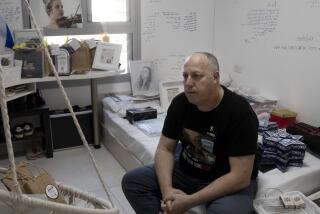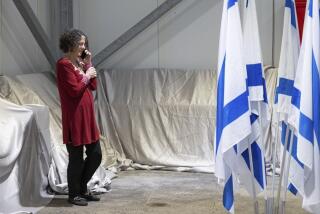Parents of Bosnia Serbs’ Foe Live to Taste Freedom
- Share via
SARAJEVO, Bosnia-Herzegovina — As residents of the front-line, Serb-held neighborhood of Grbavica, Albert and Antonija Alkalaj had more reason than most to be careful.
He is a Jew and she a Croat. But it was not just a question of ethnicity in this battered section of Sarajevo from which thousands of non-Serbs were expelled at the start of the war.
The Alkalajs are parents of a natural enemy of a Bosnian Serb state: the Muslim-led government’s ambassador to the United States.
During four years of war, Albert and Antonija Alkalaj survived through discretion and goodwill. Like other non-Serbs, they lived a kind of imprisonment, confined to the borders of Grbavica, cautious about whom they spoke to and what they said. For almost four years, they did not see their son, the ambassador.
On Tuesday, as Grbavica was restored to Muslim-Croat government control under last fall’s Dayton, Ohio, peace accord, the Alkalajs joined the few remaining residents in an emotional, bittersweet outpouring of relief.
Antonija Alkalaj was not sure whether to laugh or cry. “I can’t rejoice,” she said. “I’ve been waiting so long. I can’t believe things will change and that I don’t have to be afraid anymore.”
The local authorities knew who they were. Albert Alkalaj was called into the police station a couple of times and questioned. The police chief even offered to let him leave Grbavica, saying that Bosnian Serb army commander Gen. Ratko Mladic, an indicted war criminal, would provide for his safety.
And they probably could have left at any time. But they refused. Albert, especially, seemed deterred by the Yugoslav sense of the importance of home and a distaste for life in exile.
“Why would we go?” Albert, 82, said. “It can be more dangerous to go somewhere. If you go from one place to another, there is no way really to be a man. You are a refugee. Here, I am at home.”
Said Antonija, 72: “This is our home. There is nothing very valuable, except the paintings and my library. But it is all mine. . . . We are not young anymore. I would not like to be a burden on anyone.”
Their son, Ambassador Sven Alkalaj, begged them to leave in letters that friends were able to carry into Grbavica and in the three phone calls a year, on average, that Antonija Alkalaj could make from a local hospital.
“I was really afraid for their security,” the ambassador said Tuesday in a telephone interview from Washington. “I told them it was not worth risking their lives to keep that apartment.”
If life in Grbavica was hell, the last days before the hand-over were something worse. Fires set by departing Serbs raged around the Alkalajs in apartment buildings and abandoned cars. The Serbian refugees who had occupied the upstairs flat left, taking all the furniture and the plumbing, consequently flooding most of the building.
“Every morning I woke up and thanked my guardian angel for keeping me alive,” Antonija Alkalaj said.
The two passed the long months of the war by maintaining a circle of friends and their dignity. Antonija, a retired English professor, wears pearls and a single earring (the other broke, and there was no place to fix it in Grbavica). Albert busies himself with humanitarian work.
In fact, Albert’s Judaism undoubtedly helped spare him Bosnian Serb harassment. He is a prominent member of the former Yugoslav republics’ active Jewish community, which throughout the war maintained good relations with all ethnic parties, according to local leaders.
On Tuesday, the Alkalajs received a near-endless stream of visitors, returning friends and neighbors. There were many hugs, tears and questions about long-lost lives.
An early visitor was Mirza Jamakovic, the one-armed chief of Sarajevo’s bomb squad and the son of one of Antonija’s best friends. Jamakovic, a Muslim who grew up with Sven but who had not seen the Alkalajs in four years, was celebrating his 52nd birthday Tuesday as he directed the clearing of mines and booby traps in Grbavica.
His 10-year-old son was killed and his 17-year-old daughter badly wounded in a shelling last year. Antonija Alkalaj wept as she told him that she had learned of it on television.
“This war has been such a great life lesson,” she said later. “My values are reversed. What was so important before isn’t. Now, just life, normal life, and the health of my family--that’s important. . . . It’s good that freedom has finally come.”
More to Read
Sign up for Essential California
The most important California stories and recommendations in your inbox every morning.
You may occasionally receive promotional content from the Los Angeles Times.














